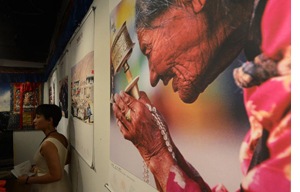
A new art project that collects and blends individual emotions expressed in social media will be on display at the iconic Water Cube, shifting its appearance according to how netizens express themselves on any given day.
Starting from June 23, the building used to hold events during the 2008 Beijing Olympic Games will be illuminated by a LED light display that changes daily with the help of computer analysis of both the I Ching, an ancient text that details changes in the forces of nature, and posts from Sina Weibo, the Chinese equivalent of Twitter.
"The computer program will pick icons representing different emotions expressed on Weibo. The amount varies from at least 18 million to hundreds of millions a day," said Jennifer Wen Ma, chief designer of the art project "Nature and Man in Rhapsody of Light".
The color, brightness and rhythm of the lights will change according to analyses of the posts, as well as contemporary color theory and psychology, Ma explained.
When defining the colors to be used, Ma only considered people's physiological reactions to them. Cultural, political and other geographical factors were all excluded.
"For example, warm colors like red, yellow and orange usually represent joy, excitement and sometimes fickleness, while cold ones like blue, purple and gray make you feel quiet," she said.
The daily display will also serve as an aesthetic expression of the I Ching, which can be embodied through concrete symbols like wind and water, said the artist, a member of the core creative team behind the opening and closing ceremonies of the Beijing Olympics.
"The computer will analyze symbols and translate them into color, speed and rhythm," she said. "I hope to utilize technology to bridge the divide between man and nature."
The project will begin synchronously with the sunset each day."I regard the first 10 minutes as a wake-up ceremony. A shade of deep blue will gradually rise from the bottom of the Water Cube and it will take five minutes for it to reach the top and cover the whole building. Then the cellular 'skin' will 'breathe' for another five minutes in rhythm with the twinkling of the lights," she said.
"After the wake-up, the lights will display the computer's interpretation of the day's Weibo posts for 10 minutes, and then go back to the deep blue color," she said, adding that the 10-minute display will repeat every hour until 10 pm.
"I see the Water Cube as a living creature and the bubbles as its cells. They absorb power from nature and the surroundings in the daytime and set a mood through the lights at night," she said.
Stressing that the project is a piece of conceptual art rather than a mere light show, the artist said she hopes people who are passing by will connect with it.
"It's a mirror that reflects society and everyone in it," she said.
"The art doesn't take place on the facade of the Water Cube, but in people's hearts," she said. "What really matters is the people's feelings about the project."
Lighting designer Zheng Jianwei, who started working on the project with Ma in July 2012, said the project will serve as inspiration for the redevelopment of iconic sites.
"Many iconic buildings in China receive rather negative comments. People feel psychologically distant from them. By involving public emotions derived from social media, the Water Cube is closer to the people and can act as a new platform for expression," he said.
"An iconic building should not act only as an authoritative symbol for just a few people. It should go back to the public and reflect society," he said.
|
|
|
| Modern 'Swan Lake' ballet rehearsed in Australia | ?Tibetan carpet exposition opens in Xining, NW China |



